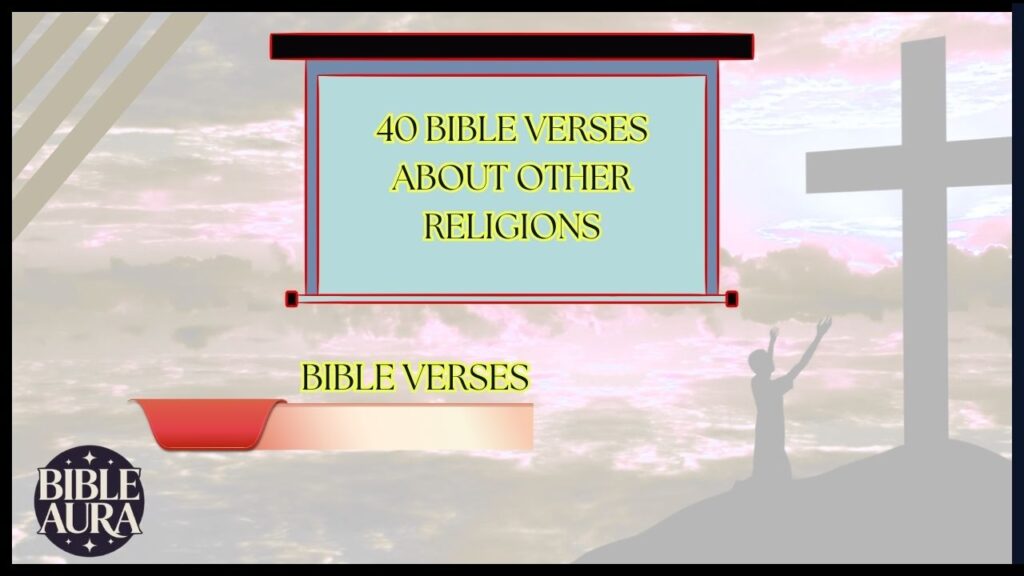Bible Verses About Other Religions: In our increasingly connected world, Christians find themselves navigating relationships with people from diverse faith backgrounds.
Whether it’s a coworker who practices Islam, a neighbor who follows Hinduism, or a family member who has chosen a different spiritual path, these interactions can leave us wondering: What does the Bible say about other religions?
How should believers respond with both love and biblical truth?
This topic matters deeply because it touches the very heart of Christian living balancing our firm faith in Jesus Christ as the way to salvation while treating others with respect, kindness, and compassion.
The scripture provides clear guidance on how to engage with those of different beliefs while maintaining our commitment to the Gospel.
These Bible verses about other religions will equip you with wisdom and discernment for meaningful, grace-filled conversations.
Understanding what God’s Word says about interfaith relationships and religious tolerance helps us live as effective witnesses for Christ while honoring the golden rule of loving our neighbor as ourselves.
Let’s explore what the Old Testament and New Testament teach us about navigating this important aspect of faith.
Also Read: 38 Bible Verses About Dreams Coming True
Bible Verses About Other Religions
The Bible offers profound wisdom for Christians on how to interact with people of different beliefs. These verses emphasize love, respect, and gentleness while maintaining our commitment to biblical truth. Here are 40 carefully selected scriptures that provide guidance for respectful engagement with those of other religions.
Understanding God’s Universal Love (Verses 1-5)
1. 📖 John 3:16
“For God so loved the world that he gave his one and only Son, that whoever believes in him shall not perish but have eternal life.”
🔍 Meaning: God’s love extends to every person on earth, regardless of their current religious affiliation. This verse reveals the heart of our Creator His desire for all humanity to experience salvation through Jesus Christ.
💡 Application: Remember that every person you meet is deeply loved by God, creating a foundation for compassionate interaction.
2. 📖 2 Peter 3:9
“The Lord is not slow in keeping his promise, as some understand slowness. Instead he is patient with you, not wanting anyone to perish, but everyone to come to repentance.”

🔍 Meaning: God demonstrates incredible patience with all people, desiring that everyone would turn to Him. This patience should characterize our approach to interfaith dialogue.
💡 Application: Extend the same patience God shows to you when engaging with unbelievers or those of other faiths.
3. 📖 1 Timothy 2:4
“Who wants all people to be saved and to come to a knowledge of the truth.”
🔍 Meaning: God’s heart is for universal salvation He genuinely desires every person to know the truth found in Jesus Christ.
💡 Application: Let God’s desire for all people motivate your prayers and interactions with those of different beliefs.
4. 📖 Romans 10:12-13
“For there is no difference between Jew and Gentile the same Lord is Lord of all and richly blesses all who call on him, for, ‘Everyone who calls on the name of the Lord will be saved.'”
🔍 Meaning: God shows no favoritism based on ethnic or religious background. Salvation is available to all who call upon Jesus.
💡 Application: Approach people of all backgrounds with the same love and respect, knowing God values each person equally.
5. 📖 Acts 17:26-27
“From one man he made all the nations, that they should inhabit the whole earth; and he marked out their appointed times in history and the boundaries of their lands. God did this so that they would seek him and perhaps reach out for him and find him, though he is not far from any one of us.”
🔍 Meaning: God created all people from one source and placed them in different cultures and regions, hoping they would seek Him. Every person has the capacity to find God.
💡 Application: Recognize that God is already working in the lives of people from all religious backgrounds, drawing them to Himself.
Loving Your Neighbor Regardless of Beliefs (Verses 6-10)
6. 📖 Matthew 22:39
“And the second is like it: ‘Love your neighbor as yourself.'”
🔍 Meaning: The command to love your neighbor makes no exceptions based on religious affiliation. This golden rule applies to everyone around us.
💡 Application: Show practical love to people of other religions through acts of kindness and service.
7. 📖 Luke 10:27
“He answered, ‘Love the Lord your God with all your heart and with all your soul and with all your strength and with all your mind’; and, ‘Love your neighbor as yourself.'”
🔍 Meaning: Love for God and love for neighbor are inseparably connected. True faith in God produces love for all people.
💡 Application: Let your love for God overflow into genuine care for people of all faiths.
8. 📖 Romans 13:10
“Love does no harm to a neighbor. Therefore love is the fulfillment of the law.”
🔍 Meaning: Love actively seeks the good of others and avoids causing harm. This includes emotional and spiritual harm through harsh or condemning words.
💡 Application: In interfaith relationships, always choose words and actions that build up rather than tear down.
9. 📖 1 John 4:20
“Whoever claims to love God yet hates a brother or sister is a liar. For whoever does not love their brother and sister, whom they have seen, cannot love God, whom they have not seen.”

🔍 Meaning: Our love for God is demonstrated through our love for people. Hatred or animosity toward others contradicts our faith.
💡 Application: Examine your heart for any prejudice or hatred toward people of different beliefs and ask God to replace it with love.
10. 📖 Galatians 6:10
“Therefore, as we have opportunity, let us do good to all people, especially to those who belong to the family of believers.”
🔍 Meaning: Christians should actively do good to all people, not just fellow believers. Our kindness should extend beyond our faith community.
💡 Application: Look for practical ways to serve and help people of other religions in your community.
Sharing Faith with Gentleness and Respect (Verses 11-15)
11. 📖 1 Peter 3:15
“But in your hearts revere Christ as Lord. Always be prepared to give an answer to everyone who asks you to give the reason for the hope that you have. But do this with gentleness and respect.”
🔍 Meaning: Christians should be ready to explain their faith but must do so with gentleness and respect. The manner of sharing faith is as important as the message itself.
💡 Application: When discussing faith with people of other religions, prioritize a respectful and gentle approach over winning arguments.
12. 📖 Colossians 4:6
“Let your conversation be always full of grace, seasoned with salt, so that you may know how to answer everyone.”
🔍 Meaning: Our words should be gracious and wise, creating conversations that are both truthful and appealing.
💡 Application: Before engaging in interfaith dialogue, pray for wisdom to speak with both truth and grace.
13. 📖 2 Timothy 2:24-25
“And the Lord’s servant must not be quarrelsome but must be kind to everyone, able to teach, not resentful. Opponents must be gently instructed, in the hope that God will grant them repentance leading them to a knowledge of the truth.”
🔍 Meaning: Christians should avoid arguments and instead focus on gentle instruction. Change comes through God’s work, not through aggressive debate.
💡 Application: When someone challenges your faith, respond with kindness and patience rather than defensiveness.
14. 📖 Titus 3:2
“To slander no one, to be peaceable and considerate, and always to be gentle toward everyone.”
🔍 Meaning: Believers should demonstrate gentleness and consideration toward all people, avoiding harsh criticism or slander.
💡 Application: Speak respectfully about other religions and their followers, even when you disagree with their beliefs.
15. 📖 Ephesians 4:15
“Instead, speaking the truth in love, we will grow to become in every respect the mature body of him who is the head, that is, Christ.”

🔍 Meaning: Truth and love must be balanced together. Speaking truth without love can be harmful and ineffective.
💡 Application: When sharing the Gospel, ensure your words are motivated by love for the person, not just a desire to be right.
Avoiding Judgment and Condemnation (Verses 16-20)
16. 📖 Matthew 7:1-2
“Do not judge, or you too will be judged. For in the same way you judge others, you will be judged, and with the measure you use, it will be measured to you.”
🔍 Meaning: Christians are warned against harsh judgment of others. The standard we use to judge others will be applied to us by God.
💡 Application: Focus on examining your own heart rather than condemning people of other religions.
17. 📖 Romans 14:10
“You, then, why do you judge your brother or sister? Or why do you treat them with contempt? For we will all stand before God’s judgment seat.”
🔍 Meaning: Ultimate judgment belongs to God alone. We are not qualified to make final judgments about others’ eternal destiny.
💡 Application: Leave judgment to God and focus on loving and serving people of different beliefs.
18. 📖 James 4:12
“There is only one Lawgiver and Judge, the one who is able to save and destroy. But you who are you to judge your neighbor?”
🔍 Meaning: God is the only righteous judge. Humans lack the authority and wisdom to make ultimate judgments about others.
💡 Application: Humble yourself by recognizing your limitations and trusting God’s perfect justice.
19. 📖 Luke 6:37
“Do not judge, and you will not be judged. Do not condemn, and you will not be condemned. Forgive, and you will be forgiven.”
🔍 Meaning: God’s treatment of us mirrors our treatment of others. Mercy and forgiveness should characterize our interactions.
💡 Application: Choose mercy over condemnation when interacting with people who hold different beliefs.
20. 📖 Romans 2:1
“You, therefore, have no excuse, you who pass judgment on someone else, for at whatever point you judge another, you are condemning yourself, because you who pass judgment do the same things.”
🔍 Meaning: Judgment of others often reveals our own hypocrisy, as we ourselves fall short of God’s standards.
💡 Application: Remember your own need for grace when tempted to harshly judge people of other religions.
Recognizing Jesus as the Way to Salvation (Verses 21-25)
21. 📖 John 14:6
“Jesus answered, ‘I am the way and the truth and the life. No one comes to the Father except through me.'”
🔍 Meaning: Jesus Christ is the exclusive path to salvation. This truth doesn’t negate our call to love others, but establishes the foundation of our faith.
💡 Application: Hold firmly to the truth of salvation through Jesus while loving those who believe differently.
22. 📖 Acts 4:12
“Salvation is found in no one else, for there is no other name under heaven given to mankind by which we must be saved.”

🔍 Meaning: The exclusivity of salvation through Jesus is clearly established in scripture. This motivates our evangelism efforts.
💡 Application: Share this truth with compassion and urgency, knowing that Jesus is humanity’s only hope.
23. 📖 1 Timothy 2:5-6
“For there is one God and one mediator between God and mankind, the man Christ Jesus, who gave himself as a ransom for all people. This has now been witnessed to at the proper time.”
🔍 Meaning: Jesus Christ serves as the unique mediator between God and humanity. His sacrifice provides the way for all people to approach God.
💡 Application: When engaging with people of other religions, gently point them toward Jesus as the bridge to God.
24. 📖 Romans 10:9
“If you declare with your mouth, ‘Jesus is Lord,’ and believe in your heart that God raised him from the dead, you will be saved.”
🔍 Meaning: Salvation requires specific faith in Jesus Christ as Lord and in His resurrection. This is the Gospel message we’re called to share.
💡 Application: Clearly explain the path to salvation when opportunities arise in interfaith conversations.
25. 📖 Ephesians 2:8-9
“For it is by grace you have been saved, through faith and this is not from yourselves, it is the gift of God not by works, so that no one can boast.”
🔍 Meaning: Salvation comes through God’s grace alone, not through religious works or rituals. This distinguishes Christianity from works-based religions.
💡 Application: Help people of other religions understand that salvation is a free gift, not something earned.
Wisdom in Interfaith Interactions (Verses 26-30)
26. 📖 Proverbs 27:5-6
“Better is open rebuke than hidden love. Wounds from a friend can be trusted, but an enemy multiplies kisses.”
🔍 Meaning: Sometimes love requires speaking difficult truths, but this must be done by someone who has established a loving relationship.
💡 Application: Build genuine friendships with people of other religions before attempting to address spiritual differences.
27. 📖 Ecclesiastes 3:1
“There is a time for everything, and a season for every activity under the heavens.”
🔍 Meaning: Wisdom includes knowing the right time to speak and the right time to listen. Not every moment is appropriate for evangelism.
💡 Application: Ask God for discernment about when to share faith and when to simply love and serve.
28. 📖 Proverbs 25:11
“Like apples of gold in settings of silver is a ruling rightly given.”
🔍 Meaning: Words spoken at the right time and in the right manner are precious and effective.
💡 Application: Pray for God’s timing and wisdom when discussing faith with people of different beliefs.
29. 📖 James 1:5
“If any of you lacks wisdom, you should ask God, who gives generously to all without finding fault, and it will be given to you.”

🔍 Meaning: God freely gives wisdom to those who ask for it, especially in challenging situations requiring discernment.
💡 Application: Regularly pray for wisdom in navigating interfaith relationships and conversations.
30. 📖 Philippians 4:5
“Let your gentleness be evident to all. The Lord is near.”
🔍 Meaning: Gentleness should be a visible characteristic of Christians, serving as a testimony to God’s character.
💡 Application: Make gentleness your default approach in all interfaith interactions.
Also Read: 37 Bible Verses About Being Lukewarm
Living as Examples of Faith (Verses 31-35)
31. 📖 Matthew 5:16
“In the same way, let your light shine before others, that they may see your good deeds and glorify your Father in heaven.”
🔍 Meaning: Christian behavior should point others toward God. Our actions often speak louder than our words in interfaith settings.
💡 Application: Live in such a way that people of other religions are curious about the source of your joy and peace.
32. 📖 1 Peter 2:12
“Live such good lives among the pagans that, though they accuse you of doing wrong, they may see your good deeds and glorify God on the day he visits us.”
🔍 Meaning: Excellent behavior serves as a powerful witness, even to those who initially oppose Christianity.
💡 Application: Let your integrity and kindness in interfaith relationships serve as a testimony to God’s character.
33. 📖 Philippians 2:15
“So that you may become blameless and pure, ‘children of God without fault in a warped and crooked generation.’ Then you will shine like stars in the sky.”
🔍 Meaning: Christians are called to live distinctively righteous lives that stand out in a morally confused world.
💡 Application: Let your moral character distinguish you positively among colleagues and friends of different beliefs.
34. 📖 Titus 2:7-8
“In everything set them an example by doing what is good. In your teaching show integrity, seriousness and soundness of speech that cannot be condemned, so that those who oppose you may be ashamed because they have nothing bad to say about us.”

🔍 Meaning: Christian conduct should be so exemplary that even critics cannot find legitimate fault with it.
💡 Application: Strive for such excellent character that people of other religions respect your integrity.
35. 📖 1 Thessalonians 4:11-12
“And to make it your ambition to lead a quiet life: You should mind your own business and work with your hands, just as we told you, so that your daily life may win the respect of outsiders and so that you will not be dependent on anybody.”
🔍 Meaning: A humble, hardworking, and respectful lifestyle earns credibility with unbelievers and creates opportunities for witness.
💡 Application: Focus on being an excellent employee, neighbor, and citizen to build bridges with people of other religions.
The Great Commission and Evangelism (Verses 36-40)
36. 📖 Matthew 28:19-20
“Therefore go and make disciples of all nations, baptizing them in the name of the Father and of the Son and of the Holy Spirit, and teaching them to obey everything I have commanded you. And surely I am with you always, to the very end of the age.”
🔍 Meaning: Jesus commanded His followers to share the Gospel with people of all nations and religious backgrounds. This is the Great Commission.
💡 Application: See interfaith relationships as opportunities to fulfill Jesus’ command to make disciples.
37. 📖 Romans 10:14-15
“How, then, can they call on the one they have not believed in? And how can they believe in the one of whom they have not heard? And how can they hear without someone preaching to them? And how can anyone preach unless they are sent? As it is written: ‘How beautiful are the feet of those who bring good news!'”
🔍 Meaning: People cannot believe in Jesus without hearing about Him. Christians have the responsibility to share this good news.
💡 Application: Look for natural opportunities to share the Gospel with people of other religions in your life.
38. 📖 2 Corinthians 5:20
“We are therefore Christ’s ambassadors, as though God were making his appeal through us. We implore you on Christ’s behalf: Be reconciled to God.”
🔍 Meaning: Christians serve as representatives of Christ, carrying His message of reconciliation to the world.
💡 Application: Approach interfaith relationships with the understanding that you represent Jesus Christ to others.
39. 📖 Isaiah 52:7
“How beautiful on the mountains are the feet of those who bring good news, who proclaim peace, who bring good tidings, who proclaim salvation, who say to Zion, ‘Your God reigns!'”
🔍 Meaning: Those who share the Gospel message are beautiful in God’s sight, even when the message is challenging for others to hear.
💡 Application: Take encouragement in knowing that God values your efforts to share His love with people of different beliefs.
40. 📖 Mark 16:15
“He said to them, ‘Go into all the world and preach the gospel to all creation.'”

🔍 Meaning: The Gospel message is meant for every person, regardless of their current religious affiliation. No one is beyond God’s reach.
💡 Application: Maintain hope and continue sharing faith with people of other religions, knowing that God desires their salvation.
How to Apply These Verses in Real Life
These Bible verses about other religions provide practical wisdom for daily interactions with people of different beliefs. Here are key ways to apply these scriptures in your interfaith relationships:
Build Genuine Relationships First: Before attempting to share your faith, invest in authentic friendships with people of other religions. Show genuine interest in their lives, families, and cultures. Love and respect must precede evangelism to be effective. When people know you truly care about them as individuals, they become more open to hearing about what matters most to you.
Practice Active Listening: Interfaith dialogue requires humility and gentleness. Ask questions about their beliefs with sincere curiosity rather than looking for opportunities to correct them. Understanding their perspective helps you communicate more effectively and shows respect for their humanity. Remember that God is already at work in their lives, and you may learn something valuable about His character through their experiences.
Live Your Faith Through Actions: Your daily conduct speaks volumes about the reality of God’s transformation in your life. Demonstrate Christian virtues like kindness, integrity, forgiveness, and generosity in practical ways. Often, people are drawn to Jesus through the love they see in His followers before they ever hear the Gospel message. Let your life serve as a beautiful advertisement for Christianity.
Memorize Key Scripture Passages: Commit verses like John 3:16, 1 Peter 3:15, and Matthew 22:39 to memory. When opportunities arise for spiritual conversations, these verses can guide your words and keep you focused on both truth and love. Scripture memorization also helps you maintain a Christ-like attitude during challenging discussions.
Pray Regularly for Wisdom and Opportunities: Ask God for discernment about when to speak and when to listen. Pray specifically for the people of other religions in your life, asking God to prepare their hearts and create natural opportunities for Gospel conversations. Prayer keeps your heart aligned with God’s heart for all people and prevents you from becoming argumentative or condemning.
Final Encouragement
As you navigate relationships with people of other religions, remember that you are walking in the footsteps of Jesus Christ, who ate with tax collectors, spoke kindly to Samaritans, and showed compassion to all who crossed His path. Your calling is not to win arguments but to win hearts through love, respect, and gentleness.
The Bible makes it clear that salvation comes only through faith in Jesus Christ, but it equally emphasizes that this truth must be shared with humility and kindness. You are planting seeds of faith through every loving interaction, trusting the Holy Spirit to work in hearts and minds in His perfect timing. Some seeds will sprout quickly, while others may take years to grow, but your faithful witness matters deeply to God and to those around you.
Take heart in knowing that God’s love for people of other religions is even greater than your own. He is actively drawing all people to Himself, and He can use your gentle words and compassionate actions as part of His amazing work of salvation. Stay faithful, stay loving, and trust God with the results of your interfaith relationships.
FAQs
Does God love people of other religions?
Absolutely yes. God’s love extends to every person on earth, regardless of their current religious beliefs. John 3:16 declares that “God so loved the world,” and 2 Peter 3:9 tells us that God “is not wanting anyone to perish, but everyone to come to repentance.” While God loves all people, the Bible teaches that salvation is found only through faith in Jesus Christ. This means we can love and respect people of other religions while still believing that Jesus is the only way to God.
How should Christians respond to people of different faiths?
Christians should respond to people of different beliefs with love, respect, and gentleness. 1 Peter 3:15 instructs us to share our faith “with gentleness and respect,” while Matthew 22:39 commands us to “love your neighbor as yourself.” This means treating people of other religions with dignity, building genuine friendships, avoiding harsh judgment, and looking for opportunities to share the Gospel through both words and actions. The goal is to reflect Jesus’ character in all our interfaith relationships.
Can Christians be friends with people of other religions?
Yes, Christians can and should build meaningful friendships with people of other religions. Jesus Himself associated with people from various backgrounds, including Samaritans, tax collectors, and Gentiles. These friendships provide natural opportunities to demonstrate Christian love and share the Gospel message. However, believers should maintain their faith convictions and avoid participating in religious practices that conflict with Christian beliefs. Friendship doesn’t require compromising your fait it requires loving others authentically while staying true to Jesus Christ.
Is it wrong to try to convert people from other religions?
The Bible commands Christians to share the Gospel with all people through the Great Commission (Matthew 28:19-20). However, the manner of sharing faith matters greatly. Evangelism should be motivated by love and conducted with respect and gentleness, not through manipulation, coercion, or condemnation. The goal is to present Jesus Christ as the way to salvation while honoring the dignity and free will of others. Ultimately, conversion is the work of the Holy Spirit our role is to faithfully share God’s love and truth, then trust God with the results.
Read more knowledgeable blogs on Bible Aura

Piper McMillan is a passionate writer and educator dedicated to sharing the beauty and depth of the Bible. As the author behind the Piper McMillan website, she explores Bible verses, unlocks biblical narratives, and provides insights for living a Christ-centered life. Through warm, approachable, and inspiring articles, Piper guides readers to deepen their understanding of Scripture and apply its timeless wisdom to daily living. Her mission is to uplift, educate, and help others walk faithfully with God, rooted in His word.



